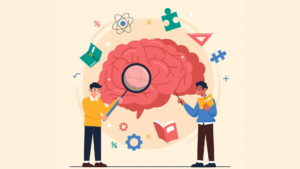The Philosophy of mind is one of the most profound and beautiful concepts. The Mind is like a Window to Our Inner World. Many people refer to the mind as the most profound and enigmatic aspect of the human experience. It is the source of our desires, memories, feelings, and thoughts. Studying philosophy of mind is similar to looking through a window into this inner world and discovering the fundamental qualities that define what it means to be human.
Humans have a lot going in mind and it impacts their overall being. Understanding the Philosophy of mind help in unbelievable ways and does wonders.
Gaining an understanding of the philosophy of mind is a journey into the core of what it is to be human. It involves considering the ideas, feelings, and consciousness of our inner selves and learning how these aspects relate to our external environment and bodily selves.
It is never just body or physical appearance, humans have more than that with feelings, emotions, psyche, and a lot. These all are the complementing factors.
You discover things about yourself along the way of Philosophy of mind, along with your thinking. You start to perceive your awareness as the light that lights your journey, your emotions as directors, and your thoughts as helpers. Understanding your mind gives you the ability to take control of your life, think clearly, feel complete, and lead an honest existence.
Your mind is who you are and when you comprehend it, you open the door to a more profound comprehension of your soul.
What Is the Philosophy of Mind?

The study of the nature of the mind and its relationships to the body and environment is known as the philosophy of mind. A human body has a mind, brain, other organs, or simply a whole anatomy. The connection of the mind and its functions to the whole body is a big area of contemplation. Basically, it poses queries such as: What is consciousness? How do ideas come to us? What relationship exists between the brain and the mind? These aspects go to the core of our existence.
The study of the philosophy of mind aims to explore and understand the nature of our mental experiences, including their definition, formation, and relationship to our physical reality.
For a brief minute to understand the Philosophy of mind, picture the ideas that are currently going through your head. They can be anything. Now contemplate, from where do they originate? Do they consist of more than just electrical impulses in your brain? How is it impacting me? Why do they keep on altering?
Philosophy of mind digs deeply into these kinds of explorations, attempting to explain the connection between our mental environment and the physical brain that appears to generate it.
We do have an awareness of our ideas, feelings, and environment. In the Philosophy of mind, Humans are beings with a feeling of self-awareness who experience life, rather than merely robots processing data.
Furthermore, our mental existence is constructed by our thoughts, which give us the ability to reason, envision, and make decisions.
The philosophy of mind is essentially an attempt to understand the nature of our interior experiences and their relationship to the outside world. It is a field that asks us to examine the most personal aspects of our lives—our feelings, thoughts, and sense of self—and to think about how these things fit into the bigger picture of reality. We can acquire a better understanding of the philosophy of mind and what it means to be human by examining it well.
Understanding some important concepts about the Philosophy of mind

Here are some beautiful explanations of some important sides of the philosophy of mind;
Consciousness: The light of Awareness

The bright light that lightens our inner world is consciousness. It is our consciousness of who we are and where we are. It is consciousness that guides us from the gloom of sleep into the bright world of experience when we awaken in the morning.
Scholars of philosophy have long disagreed on the nature of consciousness. Is it something that the physical functioning of the brain alone can explain, or is there another factor at play? Some people think of consciousness as partially explained by the brain, yet fueled by it anyway. Others believe that it is a basic aspect of the universe that we are only now starting to comprehend, similar to light or gravity.
To put it another way in the philosophy of mind, though, consciousness is what makes you “you.” It is the ability to experience happiness, sorrow, and all emotions in between. It is the cause of your ability to reflect on your own ideas and consider your existence.
Thoughts: The Flowing River of Mind
Within the field of philosophy of mind, ideas are frequently viewed as the foundation of human awareness. We can reason, plan, and make decisions because of these brain processes. When you write a letter or solve a problem, for example, your ideas are intentional. Some appear unexpectedly, much like a thing that becomes stuck in your head.
In philosophy of mind, numerous factors, including your emotions, biology, and past experiences, have an impact on your ideas. The ability to control your mind is fascinating, though in the philosophy of mind. You can affect your attitude on life and your mood, for instance, by making the decision to concentrate on positive concepts. In philosophy of mind, Many philosophical and psychological beliefs encourage us to actively shape our brains by focusing on good thoughts.
The Mind-Body Connection

In the philosophy of mind, the body and the intellect are like two sides of a single coin; they are involvedly connected yet separate. The concept of the mind-body link holds that our emotions and thoughts have an impact on our physical health and vice versa.
Let’s say you are anxious about a test that is coming up. Physical symptoms of this mental strain may include headaches and unsettled stomachs. Similarly, your intellect may feel dull and foggy if you are physically tired. We have all experienced this link between the mental and the physical in the philosophy of mind.
Exploring the Emotions
Our experiences are given color and depth by our emotions. They enable us to experience love, temper, fear, and happiness, and they are what define us. Emotions, however, are more than just sentiments; they are strong forces that can influence our behavior and mold our lives.
Emotions are frequently viewed in the philosophy of mind as the link that connects the mind and body. Your heart beats faster when you’re afraid. You may have a warm feeling in your chest while you’re happy. Your emotional state is strongly correlated with these bodily reactions, representing the intimate connection between our brains and bodies.
Knowing your feelings is essential to knowing your thinking. You can learn more about your innermost desires and thoughts by investigating what causes you to feel the way you do. Emotions are more than just feelings; they are mental signals that help you navigate the difficulties of life and convey what matters to you.
If you understand the Philosophy of mind, you certainly will be able to be more aware and particular of your existence, purpose, and yourself.













